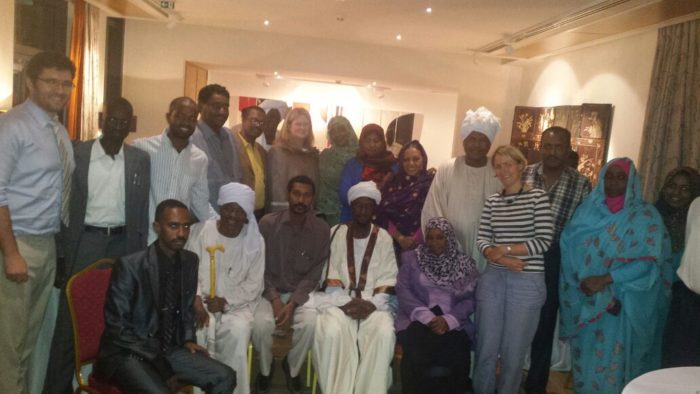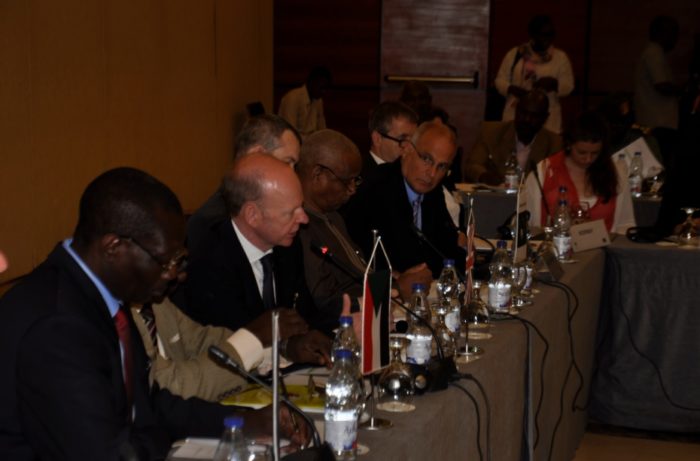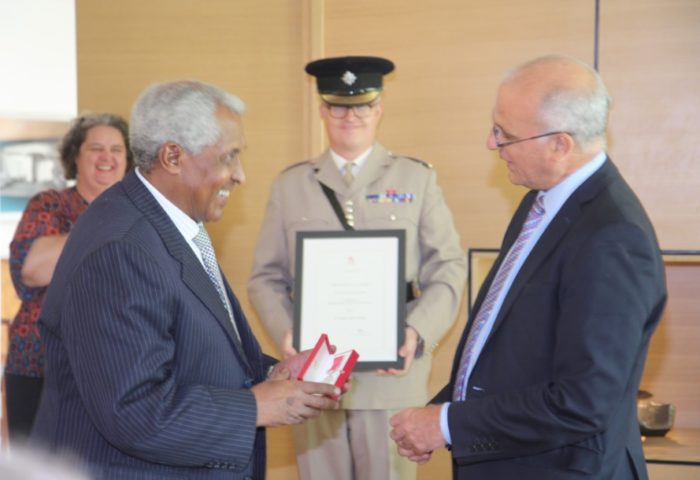6th June 2016 Khartoum
Ramadan Reflections
Ramadan Kareem!
On behalf of the British Embassy, and all the British people, I would like to wish all those observing the holy month a very happy and peaceful Ramadan. The central themes of Ramadan – where many take time to reflect on their own behaviours and give goodwill to others – are universal. Here at the British Embassy in Khartoum we looking forward to hosting what has become our traditional round of Iftars. Celebrating Ramadan with our friends and contacts from across government, opposition parties, NGOs, business, youth, media, our Chevening alumni scholars, humanitarian contacts, and of course with our colleagues, is a privilege and a pleasure. While we find that there is often so much that can drive us apart, this is a time of year that brings us together and focuses our hearts and minds on what we have in common.

We are reflecting on our new period of phased engagement –the so-called ‘Strategic Dialogue’ – with the government of Sudan. Over the last couple of months we’ve been talking more to the government on a range of issues of mutual importance. This will continue because we feel strongly that the people of Sudan deserve a Sudan that is peaceful, prosperous and stable. This is also in the UK interest. We are here to work towards that peaceful Sudan. We want to try and help create the space for a more open society and economy, to encourage the government to better able to meet the needs of its people, and to contribute positively to regional security.
To do this we need to talk to and work with all actors in Sudanese society – from government, to civil society, from opposition groups to academics and business. The Embassy has good networks in all of these areas but both we, and the government here agree, that the bilateral relationship needs some attention. We don’t expect to agree on everything, but we do expect that both sides can speak and be heard. We’ll be talking about things that matter to the government of Sudan, to the UK and of course to the Sudanese people. We’ll be talking about our direct interests, where there is common ground, such as the business environment, regional security and the issue of migration that spans countries. We’ll be giving high priority to the pursuit of peace and all the talks that go on around that, including our own engagement with the opposition, and underpinning it all the necessity for the government to uphold international standards on Human Rights. The importance of this seems amplified on the eve of Ramadan. Everyone here has a part to play in working towards a better future for Sudan.
One of the key areas of our engagement with the Government of Sudan will be combating people smuggling and illegal migration. On 24-25 May, the UK and Sudan jointly chaired an international meeting of the “Khartoum Process,” focused on people smuggling. Across two days of frank and fruitful conversations, participants from EU and African countries discussed information sharing, investigations, border management and prosecutions to break the networks which traffic migrants and endanger the lives of hundreds of thousands every year. The meeting was a positive step forward in our efforts to work closely with the government of Sudan, who ensured smooth logistical arrangements for this big event and contributed constructively to discussions throughout. The worsening of the situation in the Mediterranean, where more than 2,400 migrants have died this year making the crossing, underscores the risks if the UK and Sudan do not work together to tackle this problem.

Finally, I’m delighted to be able to highlight an award that we’ve been celebrating here at the Embassy in recent days. On behalf of Her Majesty The Queen, the Ambassador presented the British Empire Medal to a member of our Embassy team. The honours system recognises people who have made achievements in public life and committed themselves to serving and helping Britain. The British Empire Medal rewards a sustained, local contribution or innovative, high-impact work of a shorter duration. Zergaw Asfera has been employed in various roles within our Embassy security team since 1991 and has been our Post Security Manager since 2009. During this time he has dealt with many challenges. He has supported many security managers and confidently stepped into the breach when we have faced periods without such support, he has built relationships with police and government officials that have helped keep us all safe from harm. It’s wonderful that his service and dedication has been recognised in this way.

With Zergaw’s example in mind, I hope this blessed month of Ramadan brings a positive and renewed drive for us all to work towards a better future for everyone.
I think the continued great job done by the British Embassy towards the Sudanese people should be highly commended. Surely the blog is a clear reflection of that spirit:
1/ The extensive programme of Ramadan Iftar invitations for a wide spectrum of Sudanese entities, is a reflective and friendly gesture, especially when this is linked with the central themes of Ramadan: ” where many take time to reflect on their own behaviors and give goodwill to others”, in addition to feeling hunger and thirst as being experienced by those are hungry and thirsty around the globe.
2/Focusing on the issue of smuggling people and cooperating with the Sudanese Government in order to curtail this inhuman activity.
3/Encouraging National dialogue among Sudanese adversaries on one side and with the British Embassy on the other.
I like the statement:” We don’ expect to agree on everything, but we do expect that both sides ( Sudan and Britain) can speak and be heard.”, since the ultimate result will surely meet the interests of both sides.
Thank you Madame, for the wonderful words, we in Sudan, in the most intense need for cooperation friends.
Thanks for the Rmadan Message. It is a good gesture from you and the Embassy. It is interesting that you have focused in your Ramdan message on the Khartoum Process. This confirms how UK is taking this as a priority but at the expense of other strategic approaches for Sudan -which sadly are not part of the FCO agenda. The Khartoum Process is a tool for negotiating Europe’s Immigration Frontiers vis-à-vis the Horn of Africa. It tries to shift the burden from EU to Sudan and countries in the Horn of Africa however with shallow understanding of the root causes of migration. In other words, the Khartoum Process facilitates this burden shift of the physical management of Europe’s borders to African countries by funding projects that enhance border security, upgrading national legislation, and disrupting or dismantling migrant smuggling and human trafficking networks. This is truly reflected in your blog. However, it is based on flawed foundations and assumptions.
Tomorrow I will be part of a panel-with other Professors making a presentation on the UK-Sudan new engagement and the KP, at Committee Room 14, Westminster Parliament. I will also share a peer review article in the making of the above issues.
Regards
Mohamed Babiker
Associate Professor of International Law
Faculty of Law
University of Khartoum
Relations with the UK are very important.Combating people smuggling is important.So is Peace in the Sudan.Reading the literature about the current calls for Foreign Office review confirms what the Sudanese have always known;namely that there is more room and need for forward -looking contribution.That’s why the Strategic Dialogue is important.
We know the difference between “raising concerns”frankly and between the concerted anti-Sudan incitement by(Middle East Conflict- linked )organisations like Waging Peace and Aegis Trust whose aim is to obstruct trade and all cooperation with the Sudan .Partly as a result of the Dialogue ,they are increasing their well-financed campaign to scupper relations with Khartoum.
For the Sudanese ,trade and an end to the US banking blockade and unfair sanctions
top the bill of concerns.Trade with the UK cannot take off well as long as British Banks are worried about US penalties.